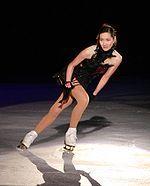Shizuka Arakawa
Shizuka Arakawa was born in Tokyo, Japan on December 29th, 1981 and is the Figure Skater. At the age of 42, Shizuka Arakawa biography, profession, age, height, weight, eye color, hair color, build, measurements, education, career, dating/affair, family, news updates, and networth are available.
At 42 years old, Shizuka Arakawa has this physical status:
When Arakawa was 5 years old, she became interested in skating and entered the Chibikko Skate School. She started ballet lessons at 7. While still 7, Arakawa began training with former Olympian Hiroshi Nagakubo, a pair skater who competed in the 1972 Winter Olympics in Sapporo, Japan. She was landing triple Salchows at age 8.
In 1994, she began participating in Japanese national skating competitions. She was named the 1994, 1995, 1996 All Japan Junior Figure athlete. Arakawa progressed through the Japanese ranks quickly and was the first skater in Japan to win three consecutive junior national titles.
Arakawa was the senior national Japanese champion in both 1998 and 1999. She made her Olympic debut when she represented Japan in the 1998 Winter Olympics in Nagano at age 16. The Emperor and Empress of Japan attended the ladies' free skate event. She placed 13th at the Nagano Olympics. At that time, she was ranked number 2 in Japan. In 2002, Arakawa finished second at Japan's national championships and, as a result, was not named to the Japanese 2002 Winter Olympics team.
During the 2002–2003 skating season, Arakawa won the Asian Winter Games and the Winter Universiade. She earned her second consecutive silver medal at the Four Continents Championships. She took the bronze at the NHK Trophy, and placed fifth at the Cup of Russia. She qualified for the ISU Grand Prix Final, where she finished fourth. She later placed third at the Japanese Nationals, marking her fifth medal from this meet, with two golds and two silvers from previous seasons.
In 2004, she won the World Championships in Dortmund, Germany, after landing seven clean triple jumps. She was the third Japanese woman to win this title after Midori Ito who won in 1989 and Yuka Sato in 1994. Arakawa had planned to retire after the 2004 World Championships, but her victory there convinced her to change her plans.
At the 2005 World Championships, Arakawa finished 9th, a disappointment which she later credited as a motivation to stay in the sport and regain top form. She felt she could not quit on such a down note. In November 2005, Arakawa changed coaches to Nikolai Morozov.
At the 2006 Winter Olympics in Turin, Italy, Arakawa skated in the short program to Fantaisie-Impromptu by Chopin. She went into the long program in third place, behind pre-event favorites Sasha Cohen and Irina Slutskaya. Less than a point separated the top three skaters. In the long program, Cohen was the first of the three leaders to skate, followed by Arakawa and Slutskaya. Cohen fell twice during her long program, leaving the door open to the other leaders.
Arakawa won the free program, skating to Vanessa Mae's Violin Fantasy on Puccini's Turandot by Giacomo Puccini. She performed an Ina Bauer and then did a three jump combination. "Ina Bauer" became a household word in Japan as a result. Although she had planned two triple-triple combinations for the free skate, she did not perform them, doing instead a triple Lutz-double loop and a triple Salchow-double toe loop combinations. Arakawa earned a total combined score of 191.34 points, almost eight points ahead of the second-place Cohen (183.36). Like Cohen, Slutskaya made mistakes in her long program, and ended up taking bronze, leaving Arakawa as the gold medal winner, which was also Japan's only medal of the 2006 games. Slutskaya was third at 181.44. At age 24, Arakawa became the oldest women's Olympic skating champion in more than 80 years. Florence "Madge" Cave Syers from the United Kingdom was the oldest when she won the Olympic title at age 27 at the 1908 Summer Olympics, which featured the first Olympic figure skating events.
After winning her Olympic title, Japanese Prime Minister Junichiro Koizumi called Arakawa in Turin, Italy to congratulate her. Koizumi said, "I cheered for you with excitement while I watched television. All the Japanese people are rejoicing. I give a perfect score to every bit of your performance."
Arakawa retired after her Olympic victory. She continued to skate in ice shows and is a regular skating commentator on Japanese television. She competed at the 2006 Ice Wars on the World team. She also produces her own show, Friends on Ice, and is a recurring cast member at Fantasy on Ice, where she performed with Mai Kuraki to the charity song "Anata ga Irukara" in 2011 amongst others. Arakawa also does choreography.
In 2006, Arakawa appeared in a Japanese TV drama, Shichinin no onna bengoshi (7 female lawyers), presented by Asahi TV. She played the role of a cool public prosecutor, Yayoi Shimasaki, in the 8th episode.
She competed in an ABC skating series "Thin Ice," aired on March 19, 2010, paired with 2006 Olympic men's silver medallist Stéphane Lambiel. They came first in the viewer's votes, and ended the series in third place, winning a total of $45,000. They skated to the songs "Get Me Bodied" by Beyoncé and "Magic" by Robin Thicke.
On April 18, 2018, it was announced Arakawa was elected to the World Figure Skating Hall of Fame.
